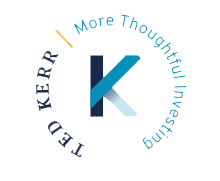Most Investors have no Idea What They Own, and that’s a Problem. The advent and ascension of mutual funds a few decades ago has led to both a blessing and a curse. The blessing is increased stock ownership by the masses. More and more people are benefiting from investing in stocks. But the curse is that these packaged products are often opaque and hard to understand, so most investors don’t truly know what they own. That works okay…until the market starts to go down.
Investors Don’t Care What They Own, as Long as it’s Working
If there is one thing I have learned in nearly 25 years of financial advising, it is that investors largely do not ask questions or pay much attention as long as their investments are “working”. When investments begin to decline beyond their acceptable threshold, however, they suddenly take an interest in understanding just what their money is up to.
Unfortunately, when markets face stormy seas, investors often choose the safety and security of a known harbor. This is a polite way of saying they sell investments after they have dropped in value, which is the opposite of what is likely in their best interest. As we’ve seen time and time again in financial history, the herd tends to follow itself off the cliff.
Product Packaging and Branding create Unnecessary Ambiguity
Investors easily understand cash and money market accounts, which is why they tend to park their money there when volatility rears up. Unfortunately, most investment products are packaged, branded, and described in ways that obfuscate what the investor is actually purchasing.
This knowledge gap leads to dramatically decreased confidence, often at the worst possible times. Nothing reveals the shakiness of investors’ confidence, and the shallow knowledge of their investments, like a negative catalyst or difficult bout of volatility.
Most Advisers don’t Know What’s in the Box Either, Until it’s Too Late
Retail investors are not the only ones left feeling confused and insecure when the markets experience a sharp decline. Most advisers prove equally incapable of navigating the murky waters of this environment, failing to pivot and properly position their investment products. Like their retail counterparts, professional investors often start asking questions at the worst possible time: when things have already gone sour.
Making an Intangible Tangible through an Ownership Mindset
Investing is a fascinating enterprise for many reasons. For one, it is a business that, in spite of an ideally empirical and fact-based approach, is focused almost entirely on intangibles. When you buy a car, a house, or other valuable asset, you can actually use your senses to size it up. You can hold it, or enter it, or drive it, and easily understand what it means to possess it in a real sense. You also understand exactly what it does, and where its value lies.
Many financial products, on the other hand, are ethereal, made even more so by the rise of the digital age. We do not even possess paper stock certificates anymore, further removing us from the ownership experience. Herein lies the advantage of direct stock ownership: you can invest in companies that produce tangible goods and services.
While you cannot experience stock ownership in the same sense as your recent vehicle purchase, you can learn a great deal about a company prior to making an ownership decision. You can understand its business plan and the environment it operates in, what products or services it manufacturers or provides, where it is in its growth cycle, and who is steering the ship.
These facts are understated in the sensationalistic world of the stock market, where much focus is put on recent news and stock ticker movements, but they can add greatly to investor confidence. Confidence comes with a reduction in uncertainty. Knowing exactly what you bought goes far in discounting what others tell you it is worth.
Common Stock Ownership Affords Advisers and Investors an Opportunity to Know What They Own
Parents and grandparents often try to get the young ones in their lives an early start in investing. The power of a dollar saved, and properly invested, is a wonderful lesson to learn, and one whose value increases exponentially the earlier it is learned. In this light, I often recommend that children are allowed to pick a publicly traded company with which they are already familiar.
Children, like the rest of us, interact with public companies every day. Buying your child a share in such a company creates a familiarity and interest in the world of investing. It helps to establish the link between business, capital, and the consumer. On a basic but fundamental level, the child begins to appreciate the role of the investor and consumer in regard to enterprise, and how she takes on both roles to directly support, benefit from, and influence the various companies in her world.
The advantages of owning what you know and love are not limited only to children. Adult investors can enjoy a similar advantage in buying companies that they already feel a connection to. Buying companies you know about is a great way to reduce uncertainty and increase confidence. Buying anything you know little about is a dangerous undertaking.


